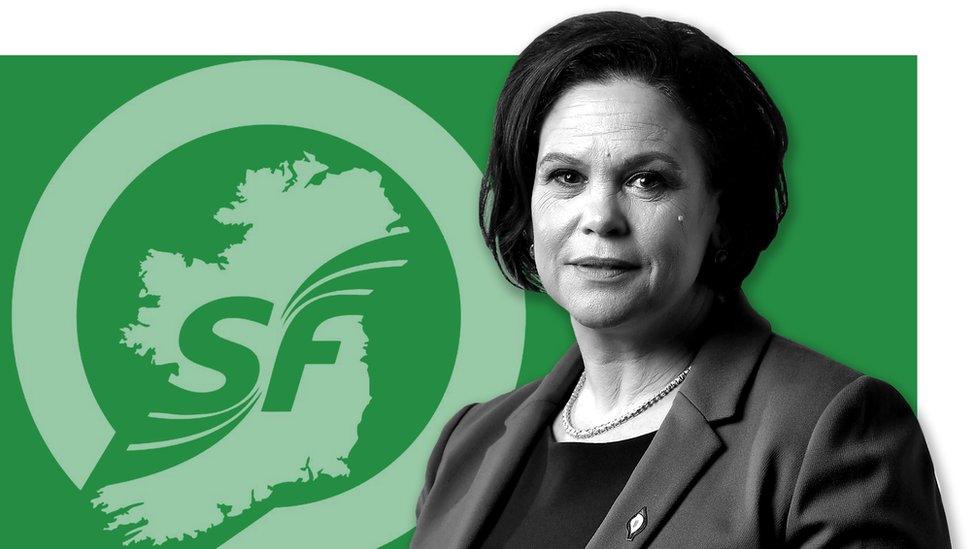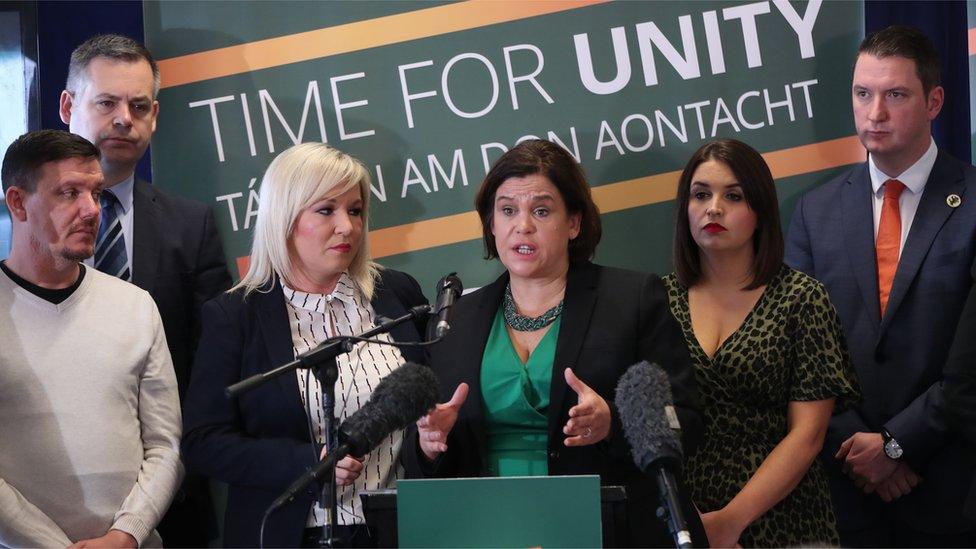Election 2019: Sinn Féin manifesto at-a-glance
- Published

Sinn Féin has unveiled its manifesto ahead of the 12 December general election.
The full document, which can be viewed here, external, focuses on Sinn Féin's approach to Brexit, as well as Irish unity, the restoration of Stormont and other issues.
The party has a long-standing policy of abstentionism, meaning its MPs do not take their seats at Westminster, and it argues that by not doing so it is fulfilling the mandate given to it by it voters.
The party's manifesto says Sinn Féin has been more effective arguing outside of Westminster - including in Dublin, Brussels and Washington - than it would have been if it had taken its seats.
Some areas, such as education or health, are devolved to the Northern Ireland Assembly, which has been suspended since January 2017.
That means the Stormont executive would need to be restored and assembly members support the particular policy before it could be introduced.
The manifesto also sets out how Sinn Féin wants to see devolved government in Northern Ireland restored.
The main policies from the party's 2019 manifesto are:
Brexit
Sinn Féin did not support Brexit and since the EU referendum in 2016 has campaigned for Northern Ireland to have what it calls "designated special status" within the EU, as well as strongly opposing a hard border in Ireland.
In practice, this special status would see Northern Ireland remain within - or very closely aligned with - the EU.
Party president Mary Lou McDonald previously said Boris Johnson's deal was a "least worst option" which would "only mitigate the worst effects of Brexit".
Its manifesto pledges on Brexit include:
Oppose Brexit
Protect the Good Friday Agreement in any future Brexit deal
Special status for Northern Ireland, with no unionist veto
Northern Ireland to automatically re-enter the EU in the event of Irish unification


Sinn Féin's battle against Brexit is not about using a vote at Westminster but using its influence in the corridors of Brussels and Dublin.
The Sinn Féin president Mary Lou McDonald says the party's "voice has been heard loud and clear" in Dublin, Brussels and Washington.
"Not only heard, it has been heeded, and acted on," she told her party's manifesto launch in Londonderry.
She pointed to the influence her party had on shaping the EU negotiating position.
In the manifesto, Sinn Féin claims credit for securing special status for Northern Ireland, no hardening of the border, protecting the Good Friday Agreement and ensuring automatic re-entry to the EU through Irish unity.
Defending her party's abstentionist policy, she said there is no Westminster solution to Brexit and she accused those who say there is of being "dishonest".

Referendum on Irish unity
One of Sinn Féin's main objectives is to campaign for a united Ireland, and push for the Northern Ireland secretary to call a referendum on whether Northern Ireland should become part of the Republic of Ireland.
The party argues that support for Irish unity is growing and says that a referendum on the topic is "no longer a question of 'if', but 'when'".
In line with that, its manifesto pledges include:
Call for the Northern Ireland secretary to set out the circumstances in which they will call an Irish unity referendum
Push the Irish government to "lead the conversation" on Irish unity by forming a Oireachtas (Irish Parliament) committee on Irish unity and publishing a green paper
Promote Irish unit as Ireland's solution to Brexit


It's probably no surprise that this commitment is high up Sinn Féin's list of priorities.
The party has previously argued that in the event of a no-deal Brexit, a border poll should be held immediately.
Critics of the party say it opposes Brexit merely to further its own constitutional strategy, but Sinn Féin maintains that the UK leaving the EU has acted as a catalyst when it comes to the conversation of Irish unity.
Since the referendum it has also been urging the Irish government to make preparations for such a poll, including setting up an all-island assembly where the key issues about a united Ireland - health, education, economy, identity and more - can be debated.
So far, both the British and Irish governments have resisted Sinn Féin's calls, arguing that a referendum on Irish unity now would only cause further division and instability, at a time when Brexit has already strained political relationships.

Devolution and the Stormont deadlock
The Northern Ireland Executive collapsed in January 2017 following a bitter row between Sinn Féin and its power sharing-partner at the time, the DUP, over a botched green energy scheme.
Sinn Féin has always said it will go back into government, provided certain conditions are met, some of which are set out in the party's manifesto:
Implement an Irish Language Act
Restore the Stormont assembly but only with substantial reform, including of the petition of concern veto mechanism
Implement the Stormont House Agreement , external
Economy
The party sits on the left of the political spectrum - it is a democratic socialist party and broadly backs left-of-centre domestic policies as well.
Its view on Irish unity also means it is keen to promote economic policies that operate on an all-Ireland basis.
Although not contained within the manifesto, Sinn Féin previously told BBC News NI its policies on the economy were:
Create more well-paid jobs, promote regional balance, reduce carbon emissions, and raise productivity
Foster an open, rights-based society that a range of people want to live, work, and invest in
Strengthen the all-Ireland economy and align Northern Ireland with the higher growth rate in the Republic of Ireland
Prioritise rural areas for broadband investment
The manifesto added that "strong economic policies that lift all parts of the economy" would be important to pursue in a restored assembly.
Environment and climate
With a series of protests about climate change grabbing headlines across the world in the past year, the issue of the environment and global warming has become more important for many voters.
The manifesto states that a restored assembly should address "action to tackle the climate emergency and investment in rural communities".
It did not contain any other specific points on this issue, but the party previously told BBC News NI its policies were:
Establish an independent environmental protection agency
Introduce a Climate Change Act with ambitious targets for reducing carbon emissions
Moratorium on the exploration and extraction of fossil fuels, and a ban on fracking
Produce a new energy strategy that prioritises renewable energy
Deliver a green new deal that creates jobs in green industries
Infrastructure
Sinn Féin's manifesto did not contain specific points on this issue, but the party previously told BBC News NI it's policies were:
Increase investment in public and rural transport
Deliver key infrastructure projects such as the A5 and A6 roads
Encourage low emission vehicles
Other notable policies
No amnesty for British soldiers accused of unlawful killings during the Troubles
Ensure people born in Northern Ireland have the right to be British, Irish or both

CONFUSED? Our simple election guide, external
POLICY GUIDE: Who should I vote for?, external
REGISTER: What you need to do to vote

What are the parties promising you?
Here's a guide to where the the other main parties in Northern Ireland stand on key issues in this election campaign.
- Published2 December 2019

- Published14 November 2019
